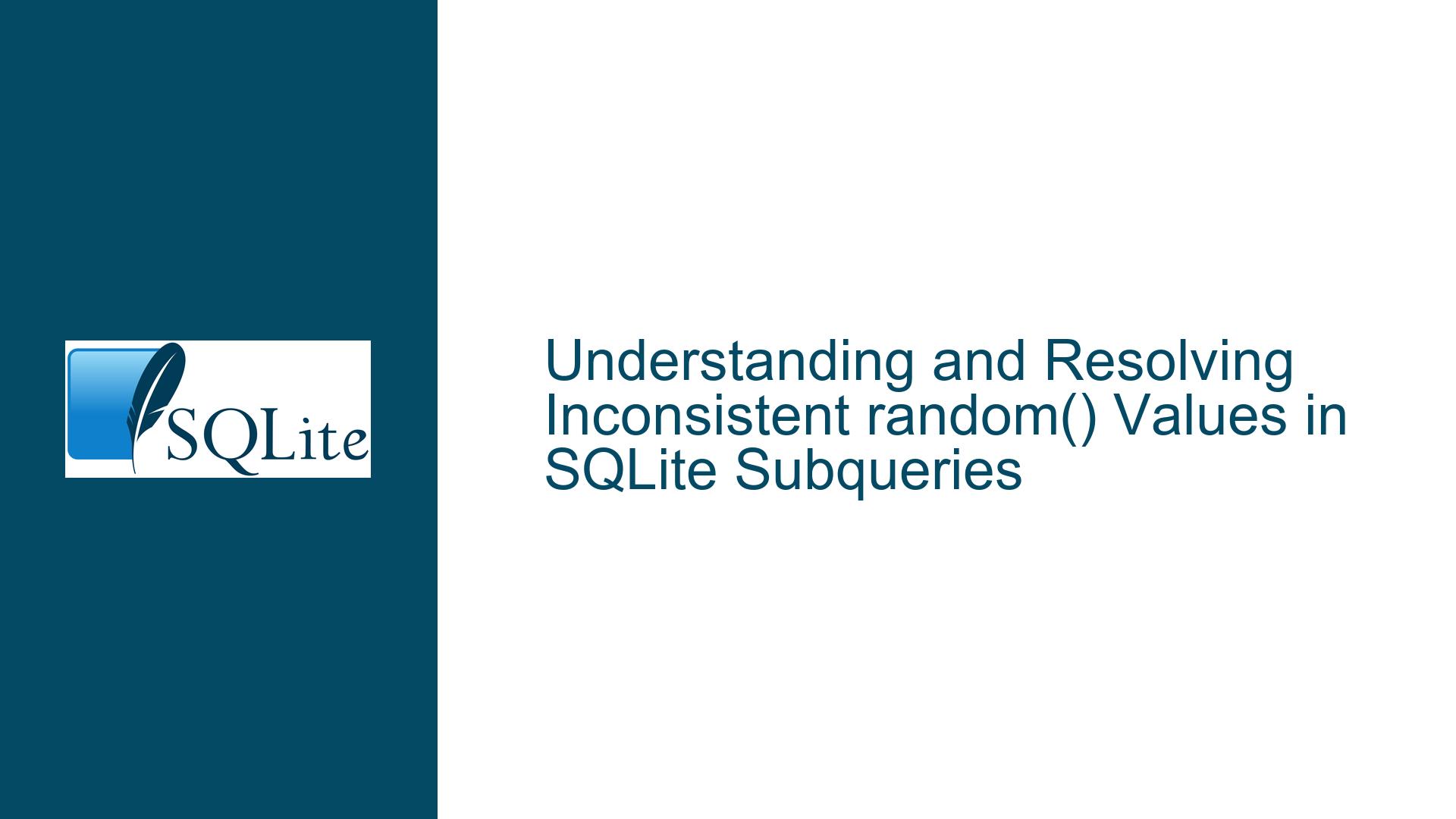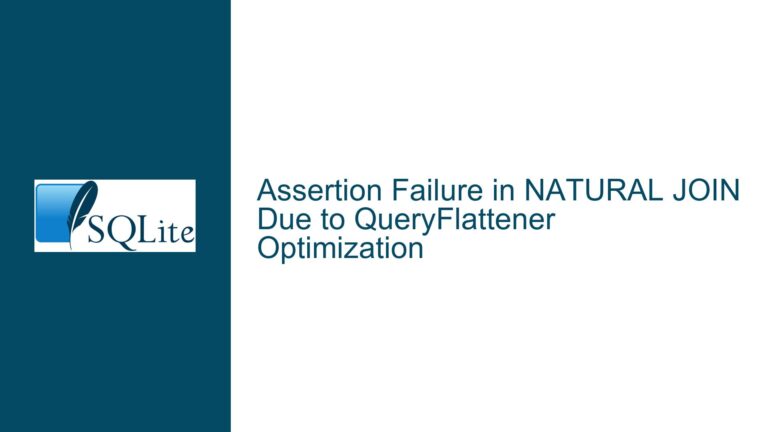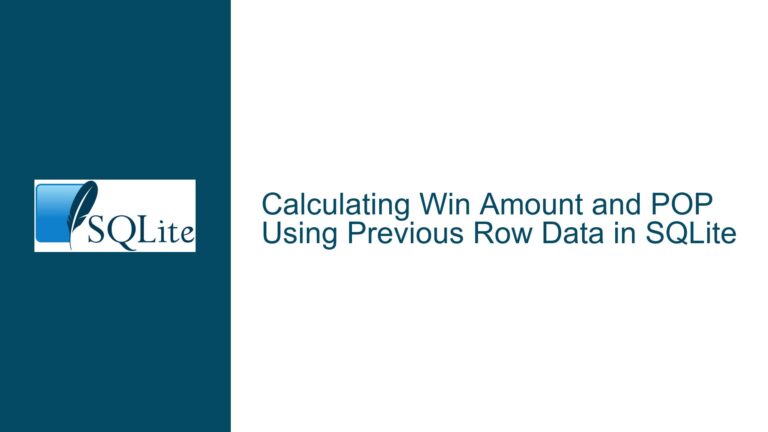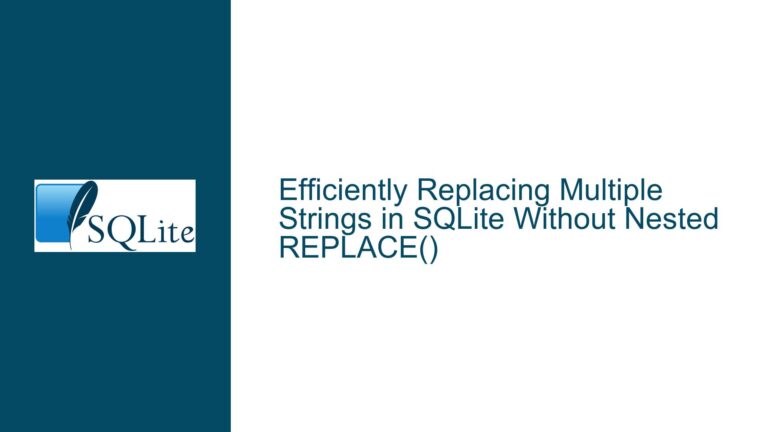and Resolving Inconsistent random() Values in SQLite Subqueries
Issue Overview: Subquery Evaluation Leading to Multiple random() Invocations
When utilizing non-deterministic functions like random() within SQLite subqueries, developers may encounter unexpected results where successive references to the same subquery column yield different values. This behavior arises due to SQLite’s query optimizer evaluating the subquery multiple times, leading to separate invocations of the random() function.
Consider the following query structure:
SELECT value, value FROM (SELECT random() AS value FROM (SELECT 1));
In this example, the outer SELECT statement references the value column twice. Intuitively, one might expect both columns to return the same random number, as they originate from the same subquery. However, SQLite may produce distinct values for each value reference. This occurs because the query optimizer transforms the query into a form that evaluates the subquery containing random() multiple times—once for each value reference in the outer SELECT.
The root cause lies in the optimizer’s decision to flatten or inline the subquery, treating it as a scalar expression that can be recomputed for each reference. Since random() is non-deterministic, each evaluation generates a new value, resulting in apparent inconsistencies. This behavior is not a bug but a deliberate optimization strategy that prioritizes performance by avoiding unnecessary materialization of intermediate results. However, it can lead to confusion when subqueries containing non-deterministic functions are involved.
Possible Causes: Query Optimizer Flattening and Non-Deterministic Function Behavior
1. Subquery Flattening by the Query Optimizer
SQLite’s query optimizer employs a technique called subquery flattening to rewrite nested queries into simpler forms that can be executed more efficiently. When a subquery is deemed trivial (e.g., a scalar subquery without dependencies on outer loops), the optimizer may eliminate the subquery entirely and inline its expressions into the parent query. In the example above, the subquery (SELECT random() AS value FROM (SELECT 1)) is flattened into two separate invocations of random(), one for each value reference in the outer SELECT. This optimization reduces overhead but causes random() to execute twice.
2. Non-Deterministic Function Semantics
SQLite classifies functions as deterministic or non-deterministic. Deterministic functions (e.g., abs(), lower()) return the same output for identical inputs, while non-deterministic functions (e.g., random(), datetime('now')) produce varying results even with identical inputs. By default, SQLite assumes that functions are deterministic unless explicitly marked otherwise. However, random() is a built-in function recognized as non-deterministic. Despite this recognition, the optimizer does not account for non-determinism during subquery flattening, leading to multiple evaluations when subqueries are inlined.
3. Lack of Automatic Subquery Materialization
Many relational database management systems (RDBMS) automatically materialize subqueries containing non-deterministic expressions to ensure consistent results across references. SQLite, however, prioritizes minimalism and performance, avoiding implicit materialization unless explicitly instructed. This design choice means that developers must manually enforce materialization when consistency is required for non-deterministic subqueries.
Troubleshooting Steps, Solutions & Fixes: Enforcing Determinism Through Materialization
1. Understanding Materialization in SQLite
Materialization refers to the process of evaluating a subquery once and storing its result in a temporary structure (e.g., a transient table or in-memory cache). Subsequent references to the materialized subquery reuse the stored result instead of re-evaluating the query. SQLite provides mechanisms to enforce materialization, ensuring that non-deterministic functions like random() are evaluated only once.
2. Using MATERIALIZED Common Table Expressions (CTEs)
A Common Table Expression (CTE) with the MATERIALIZED keyword forces the database to compute and store the result of the subquery before proceeding. This approach guarantees that all references to the CTE column return the same value, even if the subquery contains non-deterministic functions.
Example:
WITH rx(value) AS MATERIALIZED (SELECT random() FROM (SELECT 1))
SELECT value, value FROM rx;
In this revised query, the rx CTE is materialized, ensuring that random() is invoked once. Both value references in the outer SELECT retrieve the stored result, producing identical values.
Key Considerations:
- The
MATERIALIZEDkeyword is optional in most SQL dialects but critical in SQLite to prevent the optimizer from flattening the CTE. - Omitting
MATERIALIZED(or usingNOT MATERIALIZED) allows the optimizer to inline the CTE, reintroducing the risk of multiple evaluations.
3. Alternative Approaches to Enforce Single Evaluation
If CTEs are unsuitable for a specific use case, alternative strategies can achieve consistent results:
a. Temporary Tables:
Store the result of the subquery in a temporary table, which ensures a single evaluation of random().
CREATE TEMP TABLE temp_value AS
SELECT random() AS value FROM (SELECT 1);
SELECT value, value FROM temp_value;
b. Scalar Subqueries in the FROM Clause:
Rewrite the query to reference a single instance of the subquery in the FROM clause, ensuring it is evaluated once.
SELECT v.value, v.value
FROM (SELECT random() AS value FROM (SELECT 1)) AS v;
c. Session Variables (Limited Support):
While SQLite does not support session variables natively, extensions like sqlite3_bind_pointer or temporary tables can simulate variable behavior.
4. Analyzing Query Plans with EXPLAIN
To diagnose whether subquery flattening is occurring, use the EXPLAIN QUERY PLAN command to inspect the optimizer’s transformations.
Example:
EXPLAIN QUERY PLAN
SELECT value, value FROM (SELECT random() AS value FROM (SELECT 1));
The output may reveal whether the subquery is flattened into multiple SCALAR operations, indicating separate evaluations. Compare this with the query plan for the MATERIALIZED CTE version to observe the materialization step.
5. Documentation and Best Practices
- Function Determinism: Explicitly mark custom non-deterministic functions using the
SQLITE_DETERMINISTICflag when registering them withsqlite3_create_function. - Query Structure: Avoid relying on implicit materialization for subqueries involving non-deterministic functions. Always use
MATERIALIZEDCTEs or temporary tables when consistency is required. - Version-Specific Behavior: Note that SQLite’s optimizer behavior may evolve across versions. Test queries under target SQLite versions to ensure compatibility.
By understanding the interplay between SQLite’s query optimizer, non-deterministic functions, and materialization techniques, developers can write robust queries that produce consistent results. The key takeaway is to explicitly enforce materialization when working with subqueries that must be evaluated exactly once, especially when non-deterministic functions like random() are involved.






